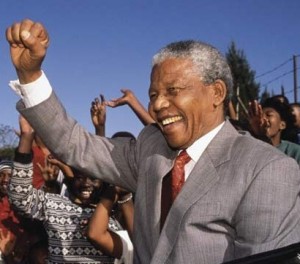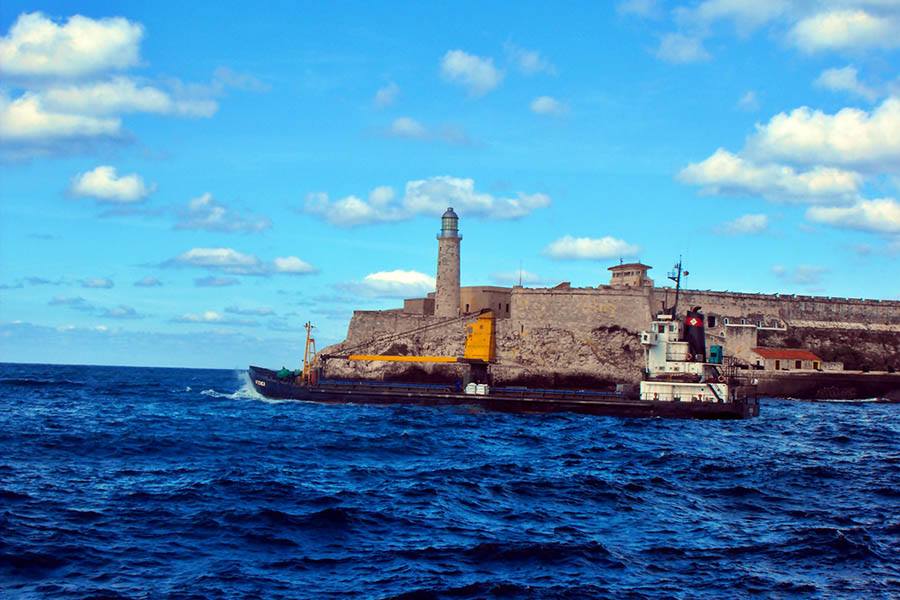Nelson Mandela, one of the most noble and admirable figures of the twentieth century, was a friend of Fidel Castro. So what? David Rockefeller also boasted the same ties. Carlos Andrés Pérez, until shortly before his exile, Fidel thought was his friend. At the end of the day, when Hugo Chavez in 1992, tried to overthrow him dead, and left dozens dead in the streets of Caracas, Fidel sent a message of solidarity and condemned the fascist action of Lieutenant Colonel.
It has been said many times: politics makes strange bedfellows (Groucho Marx claimed it was not politics, but the marriage which made strange bedfellows, but that’s another story). Mandela had good reason to be grateful to the Cuban dictator. Fidel had been strongly supportive of those who opposed apartheid, but settle racial segregation was an alibi side policy that the basic objective of Havana.
Essentially, within the logic of the Cold War, was to conquer territories for the glory of Moscow and the Communist-dominated scene. So Castro, opportunistically, in turn shifted alliances and ordered his troops to consolidate power in Ethiopia and settle in the Somali Ogaden desert. Their struggle was not against white supremacy, but the red supremacy.
However, for Mandela, or anyone within your skin tanned clubs and dungeons, a remote country like Cuba, led by a white leader, to fight send hundreds of thousands of soldiers for fourteen consecutive years against the interests of South Africa and sometimes against the army of that country, it was something that should be thanked.
For whatever reason-and of Cuba had to do with the ailing Fidel Castro personality, a guy who thought Napoleon and looks like it was-the small Caribbean island became a constant source of solidarity and support.
A Mandela should not judge him by his friends, but his immense statesman status. Was prudent and flexible, as only are the great figures of history.
He came to the prison as a Marxist willing to resort to terrorism to achieve their goals and gradually discarded the ideological nonsense and renounced violent attitudes.
He entered prison as a just angry Lenin, and 27 years later came out as a sensible and peaceful Gandhi.
He could be full of resentment-was-natural, but swallowed and knew shake hands with the opponent and replace what could have been an infinite chain of revenge by a simple mechanism of public repentance and request for forgiveness.
Alongside Desmond Tutu, led to the creation of the Commission for Truth and Reconciliation. The theme was very eloquent: “Without forgiveness there is no future without forgiveness confession does not exist.”
He became a friend of the last white president, Frederik William de Klerk, who shared the Nobel Peace Prize in 1993, and was able to understand that the majority rule could not be used to humiliate and sweep the country at 20% whites who had mistreated for centuries.
The targets were a tribe over several that made up the country. His ancestors came from England or Holland, but they were and were South Africans. He had to tell them that also had the economic and human capital.
Mandela did not try the adventure collectivist or stripped of their property to encourage whites to blacks, it would have been an immensely popular move, even though the economy had shattered.
It is true that began to rule in 1994, several years after the demolition of the Berlin Wall and the demise of the USSR and most of the European communist bloc, but was careful to understand, stay within the law and respect the private property and the market.
Declined in power forever. I could have done. Idolized him. Democratically managed the country for five years and gave way to other rulers. He knew that the serious nations institutions have more weight than people who administer the state.
It was, for all that, one of the great politicians of the twentieth century. Undoubtedly, the largest in Africa.
DDC/Carlos Alberto Montaner/InternetPhotos/www.thecubanhistory.com
THE GREATNESS OF MANDELA
The Cuban History, Hollywood.
Arnoldo Varona, Editor
LA GRANDEZA DE MANDELA
Nelson Mandela, una de las figuras más nobles y admirables del siglo XX, fue amigo de Fidel Castro. ¿Y qué? David Rockefeller también presumía de los mismos lazos. Carlos Andrés Pérez, hasta poco antes de exiliarse, pensaba que Fidel era amigo suyo. Al fin y al cabo, cuando Hugo Chávez, en 1992, trató de derrocarlo a tiros, y dejó decenas de muertos en las calles de Caracas, Fidel le mandó un mensaje de solidaridad y condenó la acción fascista del teniente coronel.
Se ha dicho muchas veces: la política hace extraños compañeros de cama (Groucho Marx aseguraba que no era la política, sino el matrimonio lo que hacía extraños compañeros de cama, pero ésa es otra historia). Mandela tenía buenas razones para mostrarse agradecido al dictador cubano. Fidel había sido intensamente solidario con quienes se oponían al apartheid, aunque liquidar la segregación racial era más una coartada política lateral que el objetivo básico de La Habana.
Lo esencial, dentro de la lógica de la Guerra Fría, era conquistar territorios para mayor gloria de Moscú y del mundillo dominado por los comunistas. Por eso Castro, de un modo oportunista, en su momento cambió de alianzas y mandó sus tropas a consolidar el poder en Etiopía y liquidar a los somalíes en el desierto de Ogaden. Su lucha no era contra la supremacía blanca, sino por la supremacía roja.
No obstante, para Mandela, o para cualquiera dentro de su piel curtida a palos y calabozos, que un país remoto como Cuba, dirigido por un líder blanco, enviara a pelear a cientos de miles de soldados durante catorce años consecutivos contra los intereses de Sudáfrica, y a veces contra el ejército de ese país, era algo que debía agradecerse.
Por las razones que fueran —y las de Cuba tenían que ver con la enfermiza personalidad de Fidel Castro, un tipo que se creía Napoleón y parece que lo era—, la pequeña isla caribeña se convirtió en una fuente constante de solidaridad y ayuda.
A Mandela no hay que juzgarlo por sus amigos, sino por su inmensa condición de estadista. Fue prudente y flexible, como solo lo son las grandes figuras de la Historia.
Llegó a la cárcel como un marxista dispuesto a recurrir al terrorismo para lograr sus propósitos y, progresivamente, desechó los disparates ideológicos y renunció a las actitudes violentas.
Entró en la prisión como un Lenin justamente colérico, y 27 años más tarde salió como un Gandhi sensato y apacible.
Podía estar lleno de rencores —era lo natural—, pero se los tragó y supo darle la mano al adversario y sustituir lo que pudo haber sido una infinita cadena de venganzas por un simple mecanismo de arrepentimiento público y solicitud de perdón.
Junto a Desmond Tutu, propició la creación de la Comisión de la Verdad y la Reconciliación. El lema era muy elocuente: “Sin perdón no hay futuro, pero sin confesión no existirá el perdón”.
Llegó a ser amigo del último gobernante blanco, Frederik William de Klerk, con quien compartió el Premio Nobel de la Paz en 1993, y fue capaz de entender que la regla de la mayoría no podía utilizarse para humillar y barrer del país al 20% de blancos que durante siglos los habían maltratado.
Los blancos eran una tribu más de las varias que componían el país. Sus antepasados procedían de Inglaterra u Holanda, pero eran y se sentían sudafricanos. Había que contar con ellos que, además, tenían los capitales económico y humano.
Mandela no intentó la aventura colectivista ni despojó de sus bienes a los blancos para favorecer a los negros, lo que hubiera sido una medida inmensamente popular, aunque hubiese destrozado la economía.
Es verdad que comenzó a gobernar en 1994, varios años después del derribo del Muro de Berlín, y de la desaparición de la URSS y de casi todo el bloque comunista europeo, pero tuvo la prudencia de entenderlo, mantenerse dentro de la ley y respetar la propiedad privada y el mercado.
No quiso eternizarse en el poder. Lo hubiera podido hacer. Lo idolatraban. Gestionó el país democráticamente durante cinco años y le dio paso a otros gobernantes. Sabía que en las naciones serias las instituciones tienen más peso que las personas que administran el Estado.
Fue, por todo eso, uno de los grandes políticos del siglo XX. Sin duda, el mayor de África.
DDC/Carlos Alberto Montaner/InternetPhotos/www.thecubanhistory.com
THE GREATNESS OF MANDELA
The Cuban History, Hollywood.
Arnoldo Varona, Editor



 THE GREATNESS OF MANDELA (Photos) * * LA GRANDEZA DE MANDELA (Fotos).
THE GREATNESS OF MANDELA (Photos) * * LA GRANDEZA DE MANDELA (Fotos).


